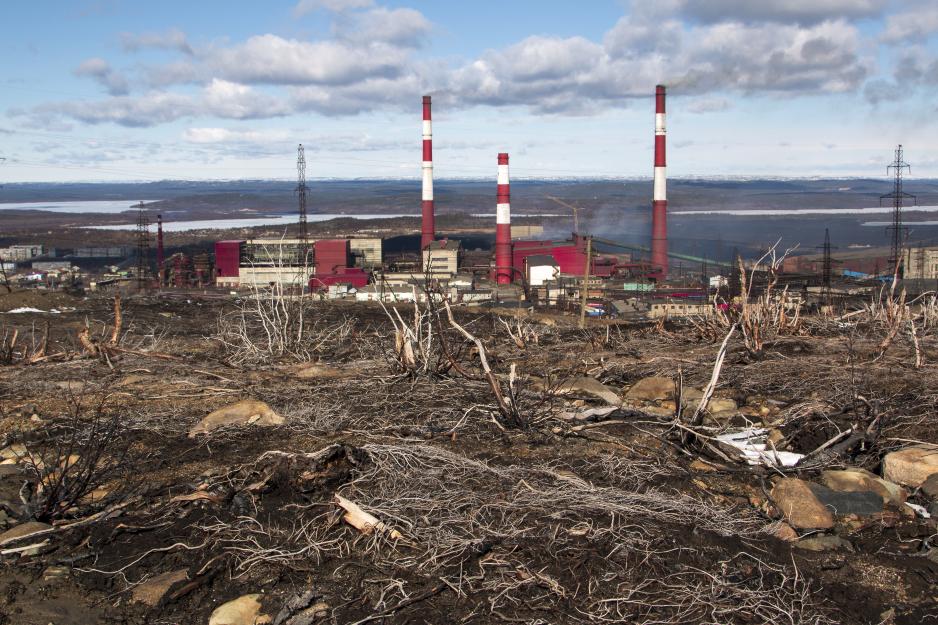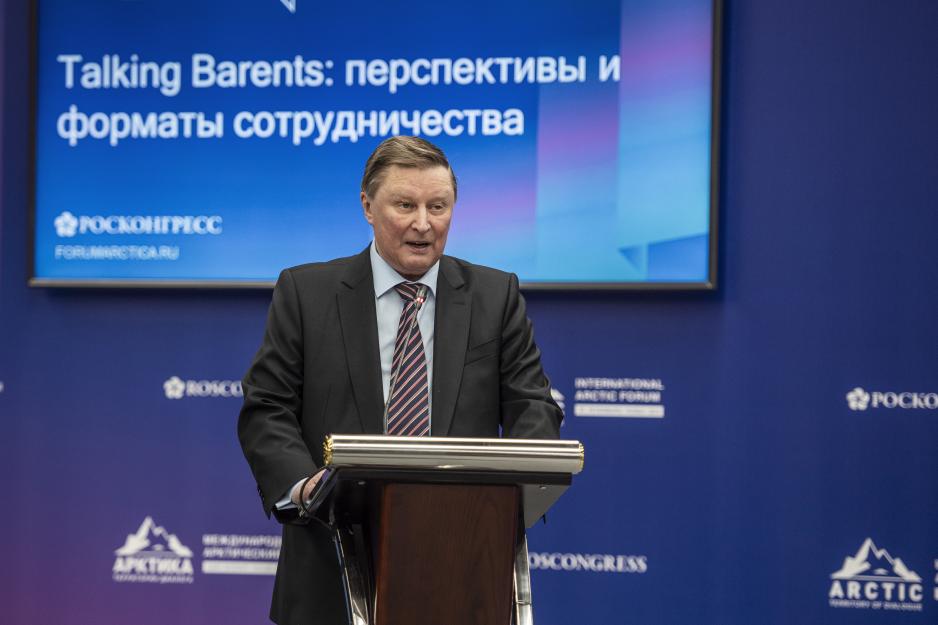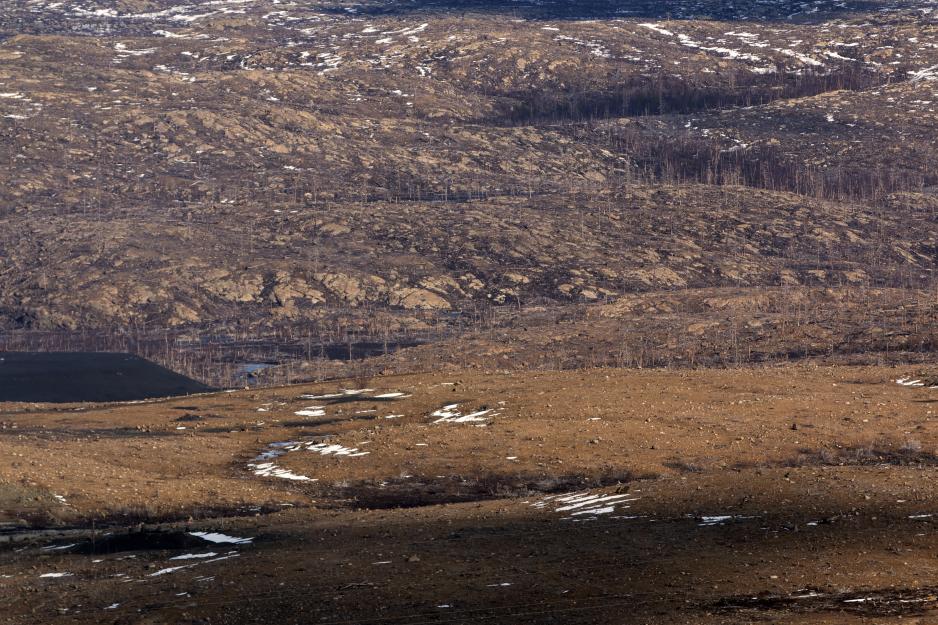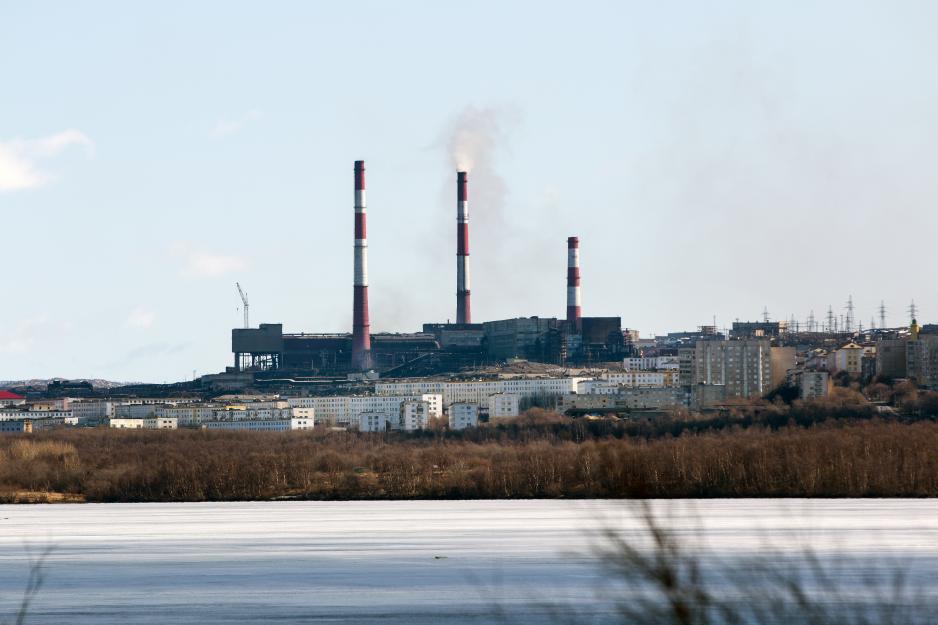There Are No Environmental Problems in Nikel, Says Putin’s Special Advisor

The problem does not exist, said President Putin’s Advisor on Environmental Issues when asked by High North New about what Russia intends to do to reduce emissions from the Nikel plant. This picture was taken on 9 May this year and shows nature in the area around the smelting plant. (Photo: Amund Trellevik)
The problem in Nikel is largely mythologized, says Sergey Ivanov, the Russian President’s Advisor on Environmental Issues. The statement baffles Norwegian authorities and experts.
NIKEL, RUSSIA: In an interview with High North News, Sergey Ivanov (66) says that the environmental problems related to production at the Nikel plant in Russia, just a few kilometers from the Norwegian border, are "non-existent".
The statements came following a seminar about the Barents cooperation during the Arctic Forum conference in St. Petersburg in April.
Ivanov, who holds the position of President Putin’s Special Advisor on Environmental Protection, Ecology and Transportation, used parts of his keynote speech to talk about the trilateral environmental protection cooperation between Norway, Russia and Finland that includes a.o. the Pasvik Inari National Park.

Sergey Ivanov spoke about the trilateral environmental cooperation between Norway, Russia and Finland when attending a seminar about the Barents cooperation during the Arctic forum in St. Petersburg. (Photo: Jonas Karlsbakk, the Barents Secretariat)
- Yes, I am sure.
After the seminar, Ivanov emphasized that there are no environmental toxin emissions to neither air nor water from the Nikel plant production.
- One thing that has been important for Norway through man years is the Nikel plant. What will the Russian government do to solve this problem?
- We have found the solution already. And the problem is largely mythologized. Because two years ago, the NorNickel plants on the Kola peninsula were fully renovated and, as I mentioned today, there is no more pollution from this plant.
- No pollution?
- No pollution. Because the water is being reused. The plant does not need external water sources anymore. And the chemical processes – there are special filters that prevent all forms of environmental pollution. So the problem does not exist.
- So there are no environmental problems in Nikel?
- Earlier, there were environmental problems. But not now. For the past two years there have not been any problems.
- But last winter, the Norwegian government warned about air pollution on the Norwegian side of the border – emissions from the Nikel plant?
- It may be from Norilsk (in Siberia, journ.note), not far from the Nikel plant. Do you know Norilsk? It may come from there. As far as I know, there are no harmful emissions from the Nikel plant.
- So there are no air polluting emissions from the Nikel plant?
- No, not from the Nikel plant on the Kola peninsula.
- Are you sure about this?
- Yes, I am sure. Thank you!
Educated KGB agent
Ivanov is not just anyone in Russian society. After studying Swedish and English at the University of Leningrad, the 66 year-old quickly climbed the ranks as KGB agent.
Later, Ivanov has held key positions such as Defense Minister, Deputy Prime Minister, Head of the Presidential Administration, Head of the Russian Security Council and Deputy Director of the FSB security services.
Since 2016, he has held the position as President Vladimir Putin’s Special Advisor on Environmental Protection, Ecology and Transport.

This picture from 9 May this year shows nature north of the town of Nikel. Some 100,000 tons of Sulphur dioxide are emitted from NorNickel’s plants in Nikel and Zabolyarny annually. That leaves its effect on the areas surrounding the cities. (Photo: Amund Trellevik)
Dangerous emissions on Norwegian side
For more than 30 years now, Norwegian authorities have tried in different ways to establish measures that may reduce the Sulphur dioxide and heavy metal emissions from Nikel.
Some 100,000 tons Sulphur dioxide are emitted from the Nikel plan, i.e. five to six times as much as the total Norwegian emissions. The wind direction makes the Pasvik Valley and Jarfjord areas on the Norwegian side of the border exposed to pollution from the Nikel plant.
NorNikel
NorNikel (formerly Norilsk Nickel) is a Russian industrial conglomerate operating mines and smelting plants.
The company extracts nickel, copper, palladium, platinum, gold and a series of other minerals.
The company has several foreign facilities, though the majority of its operations are localized on the Kola Peninsula and in the town of Norilsk, Northern Siberia.
The biggest owners are the oligarks Vladimir Potanin and Oleg Deripaska. Chelsea owner Roman Abrahamovitch also holds a minority interest.
The company’s 2018 operating result was 6.2 billion dollars.
Last winter, the emissions were so high that the threshold values on the Norwegian side were exceeded twice, in the night between the 13th and 14th of January, and on 25 January.
The Sulphur dioxide concentration was so high on 25 January that Sør-Varanger municipality warned inhabitants of the Pasvik Valley against being in the outdoors. It was in particular people with lunge problems, heart and cardio diseases who ran an acute risk of getting ill.
However, high levels of sulphur dioxide were not only measured on the Norwegian side of the border. The Russian state agency for environmental monitoring’s measurements on 23 January showed that the concentration of emissions in Nikel were ten times as high as the limit set by Russian law.
Scientist Tore Flatlandsmo Berglen at the Norwegian Insitute of Air Research (NILU) has monitored the Nikel plant emissions closely for many years.
He says it is true that the emissions have been somewhat reduced over the past few years. However, it is not true that the emissions from Nikel and Zapolyarny no longer represent a problem.
- The emissions from the Nikel plant still give sulphur dioxide concentrations that are higher than the Russian threshold values in Russia and the Norwegian threshold values in Norway. It has improved and there are plans about further reductions, however, the goal is not reached by far yet, Berglen says.
- How do you read these statements?
- He is a political advisor. I, as an academic professional, must say that what he says is not completely accurate. However, credit where credit is due to Russia for its plans about further modernization of the production. I have said for the past five years that there is reason for cautious optimism, Berglen says.
Lead Engineer Eivind Farmen of the Norwegian Environment Directorate says Norwegian authorities cooperate well with Russian pollution authorities to monitor emissions from the Nikel plant. But he emphasizes that there are still environmental problems related to the Nikel plant.
- We have bilateral cooperation with the Russians about air monitoring of Nikel and Zapolyarny. Russia has its own monitoring in the cities and we share data and harmonize monitoring techniques to make this comparable on both sides of the border. Russia, however, has different legislation in this area from what we have, and they do not relate to the EU’s threshold values. According to Russian law, this does thus not constitute high values, Farmen says to High North News.
- Makes uninformed statements
Russia expert and researcher Lars Rowe at the Fridtjof Nansen Institute wrote his PhD on the Nikel plant. He argues that the statement demonstrates that Ivanov appears not to be concerned with understanding the situation as it is.
- Ivanov here makes a most uninformed statement. It is possible that it reflects the low priority placed on environmental issues in Russian politics, Rowe says.
- Does this has to do with ignorance or unwillingness to do anything about the problem?
- Neither is right. It is all about Russia having a different approach to what environmental problems are. In western countries, there are environmental authorities whose job it is to regulate the industry in order to limit environmentally harmful emissions. In Russia, environmental legislation is solid and good, however, there are no environmental authorities that have sufficient sway to implement these regulations and enforce them, Rowe says and adds:
- The dominant power players are not the people found at the environmental authorities or in its bureaucracy, but rather in the industry. The industry will win this battle and hardly any environmental consideration efforts will be made.

The city of Nikel, a few kilometers from the Norwegian border has been named after the large deposits of nickel in the area. (Photo: Amund Trellevik)

